#still in my 风骨同守 feels
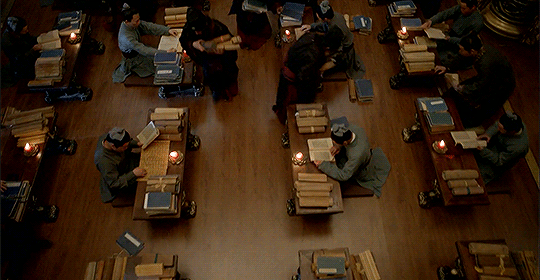
How do you depict social class disparities on a personal level, rather than masses of people with very different means and lives and the unwritten rules that divide them? How do you tell a meaningful story staked on these differences?
There are a lot of reasons why Nirvana in Fire is compelling, one of which is the assured way the narrative knows when to be subtle and when to bring the angst and drama, and its exploration of how identity is deeply entwined with social class is a great example of this.
Historical background
Though NiF is a story with a fictional historical setting/架空, it is still grounded in real history, and the choice of the Northern and Southern Dynasties as a very loose background period is no accident. During this time, the ruling class’s stranglehold on society was especially strong. In canon, you see nobles such as Xie Yu/Marquis Ning and Marquis Huaiyi own large estates and their own private militia, which was very much the situation back then. There were a large number of rebellions and unrests led by these aristocrats during this time, and being Emperor was a delicate balancing act to keep them happy but not let them gain too much power.
This kind of background is what a work of fiction generally wants to avoid directly dumping on the audience as exposition; a good period-setting story should stake its narrative conflicts on its historical basis in a logical manner and make the audience feel the conflict. As an example, the nine-rank selection system/九品中正制, the official selection process in use during the Northern and Southern Dynasties, is exactly what’s being discussed in the scene where Xiao Jingyan brings Shen Zhui and Cai Quan over to Su Manor (and in my opinion a good change from book to screen).
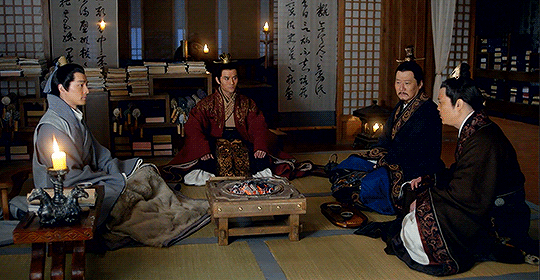
In particular, they’re talking about how to choose the selection officials/中正官 who grade candidates to be selected and ranked into positions of the imperial bureaucracy. Instead of the imperial examinations/科举 that many later dynasties use, this system has these selection officials recommend people to become officials and was instituted to replace the previous system (察举制) which had been fully taken over by the aristocracy. At first, the selection criteria of the nine-rank system were the candidate’s family background, virtue, and talent, but this again became corrupted over time by the ruling class to essentially only depend on background and connections with the selection officials. There was a well-known saying back then: 上品无寒门,下品无士族, which means no commoners in the top ranks, no upper class in the lower ranks.
In canon, corruption of this process is specifically linked to the ex-Crown Prince and Prince Yu’s power struggle, each packing the government full of well-to-do officials sympathetic to their own factions. Shen Zhui lists the factors in the process of choosing selection officials, from family background to houses of marriage and mentors, from which it’s clear that ruling class influence is inextricably tied to this process. They discuss whether to go for bold reforms and possible conflict and bloodshed, or something more incremental, and decide on choosing the least corrupt candidate within the pool of eligibility that would not ruffle feathers, essentially trying their best while staying within the bounds of the system.
This scene is also narratively important as the first Jingsu reunion after Mei Changsu was imprisoned in the Xuanjing Bureau and Jingyan discovered painfully that he had accused him of things he didn’t do. Through the class angle, I think Jingyan interprets Su Manor turning him away when he tried to visit earlier as the way a subject would implicitly slap the hand of their lord by reminding them of their place. If Jingyan has no official business to be at Su Manor, if he is only there to make a personal visit and apologize, then he is not there as Mei Changsu’s lord, but as his friend, which Jingyan has no right to be, any longer. Of course, that’s not the real reason (at least, not the only one), but Jingyan doesn’t know that. With these boundary-enforcing interactions, Jingyan believes Mei Changsu wants to remind him that he had erred precisely because he was too emotionally invested in his relationship with Sir Su instead of thinking logically, that the boundaries are there for a reason and he should maintain them.
So what does he do instead of trying to make more personal visits? He brings Shen Zhui and Cai Quan with him on an official visit from lord to subject, one specifically designed to pave a path forward for Su Zhe’s advancement in government, showing that he knows he was wrong and wants to make amends in a useful way without making an explicit apology, which Mei Changsu neither wants nor needs. Mei Changsu receives them warmly yet professionally in return, showing in turn that he has no qualms about continuing to serve his lord and that the past is past.
All in all, I find this scene a good example of subtle layered storytelling that occurs a lot in NiF: this conversation that is about social class on the surface has its underlying structure and place in the narrative also reflecting class differences. It shows how the feudal hierarchy leads to rampant misconduct in government while also warns of the dangers of venturing too far from the rules that are in place.
Mei Changsu’s (class) identities
Let’s now zoom out to the overarching story. Who is our protagonist? Someone once among the most elite of the elite class, who must now take on a commoner identity because of assumed crimes he’s innocent of. Who has to use this identity to navigate the ruling class world again in order to achieve his goals, all the while keenly aware of what he has lost.
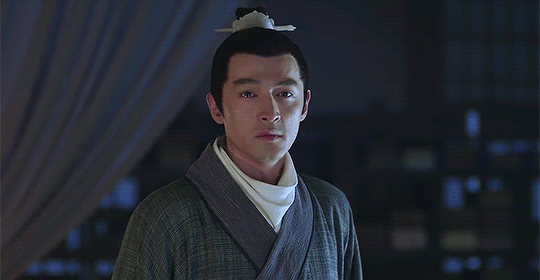
Mei Changsu’s complicated identities are all very much staked on his complicated class and status. The result of the official selection system discussed above is that the court is full of those from wealthy, privileged backgrounds, and it would be incredibly difficult for a commoner to wield any real power. So when he lost the possibility of being Lin Shu, he lost the ability to be on similar footing as Jingyan, to even serve him in the open as an official. The Su Zhe identity is a useful cover, but also a way for him to compartmentalize his own roles and separate his Jianghu lord persona (more on this later) from the commoner schemer.
And this commoner mask is an interesting one. With the Jianghu resources at his disposal, he could probably craft an aristocratic identity that would take effort to expose. But he doesn’t, precisely because he wants the enemy to underestimate him as a man frail and sickly, with no powerful family behind him. It’s easier for him to slip through the cracks and act as a weapon this way, not to mention that Jingyan being linked to an unscrupulous aristocratic schemer would have bigger ramifications for his future reign.
So although Su Zhe is respected as a learned man in the capital, it all comes with the implicit acknowledgement that he could never hold real power, and honestly, the nobles are probably relieved by that, since someone like him high up in government would be very troublesome to a lot of them. It makes a lot of sense, then, why someone like Xiao Xuan, a man who is suspicious of factions to his very bones, would so casually tell Jingyan to go get advice from Su Zhe. Because from his perspective, this Su Zhe will never amount to anything, and so he can be tortured, can be a source of counsel, can be anything he needs to be to the court without consequences.
I think this character setup is a great depiction of how class boundaries affect people on a visceral level, the way how they’re often not in-your-face barriers, but rather an invisible, oppressive force that asphyxiates you slowly. Mei Changsu is someone who knows well every corner of the palaces he’s no longer allowed to enter freely and all the people he once joked with but must now bowed down to. This lens explains why he thinks of himself as someone so underhanded and improper when he really isn’t much of a villain in practice: another layer to his self-hatred is that he can only scheme in the dark, because the system does not allow him to serve his country out in the open. Lin Shu would hate this so, so much. His character angst renders abstract concepts into real sympathetic pain in the audience, and to me, this is far more effective than many tired tropes of class conflict. You know the ones I mean: blanket depictions of good poor people and evil rich people, or grubby starving orphans juxtaposed with partygoers eating canapés.
I would be remiss not to say that despite his self-deprecating act in the capital, Mei Changsu is obviously no ordinary commoner. He’s the head of the largest alliance in the Jianghu, but that just makes the contrast between his lord and subject personas even more drastic.
The role of the Jianghu
On my first NiF watch, I found the balance of wuxia and court politics quite strange—besides the first twenty minutes, Jianghu resources that Mei Changsu can conveniently tap to do various shady things for him or bail him out of trouble, and some magical poison business, there is very little actual depiction of wuxia or the Jianghu.
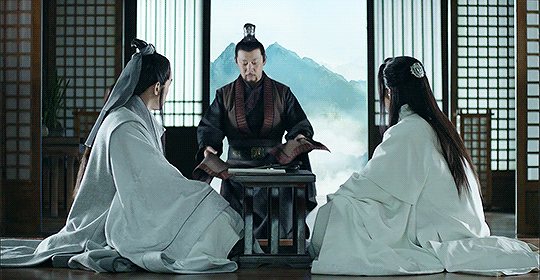
As a genre, wuxia is far more than people doing choreographed fight scenes while dangled from wires: many classic wuxia stories center on lower-class vigilantes with chivalry and honor (the xia/侠 in wuxia) trying to do good out in an unregulated Jianghu where the central bureaucracy has either failed the common people or has no reach; the government is often a background (or foreground) villain. One of the highest aspirations of a Jianghu person, in accordance with Daoist beliefs, is to live as a recluse, free of worldly concerns and one with nature. And so there’s something curious about the framework of NiF, where Mei Changsu and crew are coming in from a seemingly more unfettered existence to bind themselves to capital politics and its rigid rules (the Su Zhe identity also works in reverse: by not operating publicly as Mei Changsu, he’s preserving his reputation in the Jianghu, where people do not look fondly at all upon the government or those who work with them). Through the socioeconomic lens, I read the very few glimpses of the Jianghu as commentary on no matter how much influence you wield out there, no amount of flying magic and secret martial arts can effect real change against the insidious rigidity of the feudal hierarchy.
And so in a story that has almost nothing to do with the Jianghu, it acts as a foil to the bleak truths of the real world. Of course, it’s hardly as if the depicted Jianghu is some kind of egalitarian utopia: Mei Changsu is nevertheless lord of many people who obey him; he took the rigid structure of the army and established his own hierarchy in Langzhou (not saying that this is unusual—the typical wuxia sect is still inherently feudal). In the end, Nirvana in Fire is not a triumphant story of someone overcoming class boundaries: it’s about people very bound to the system who try to make things as good as possible within the lines. It says, even in a corrupt organization impossible to overthrow, there is hope in replacing those in power with better people, and that doing this work is meaningful even though it is difficult and at great personal costs.
After the identity reveal
Speaking of personal costs, a big plot moment that goes against modern expectations because of class identity is, well, the identity reveal itself. After Jingyan learns Mei Changsu is Lin Shu, many viewers thought there would be a warm reunion (and certainly there are a lot of fanfics on this theme). But they are no longer equals, and they cannot go back to the way things were. The reveal does not set them free—it only makes a complicated relationship even more fraught with tension. The contrast between this and his reveals with Nihuang and Nie Feng is huge, because though those two are of the upper class as well, they are not going to be the ultimate symbol and holder of imperial power.

The first time Jingsu is shown on screen together after the reveal, they only acknowledge this fact implicitly: Changsu doesn’t salute as he normally does, and Jingyan takes him to see the cell that once held Prince Qi—a commoner would not be allowed to randomly walk around the imperial prison (notice that it was Meng Zhi who was his chaperone before Jingyan took him, and earlier it was Prince Yu who had explicitly given him permission to visit Xie Yu’s cell).
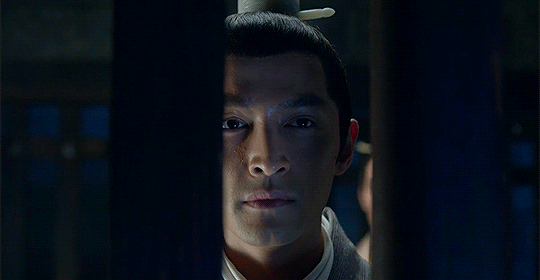
On that dramatic closeup of Changsu’s face between the bars while he’s thinking about what occurred in that cell fourteen years ago, I can’t help but also see it as a visual metaphor: trapped by his status, he’s someone who appears to walk free but is incredibly shackled by societal conventions at every turn. On the outside looking in.
Mei Changsu’s future
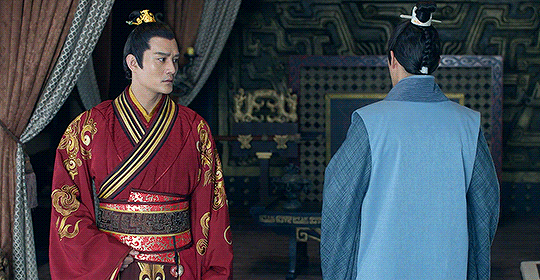
The very next Jingsu scene also cuts to the heart of this conflict, as Changsu says:
苏哲是什么样的人,全京城都知道。身为阴诡之士,行阴诡之术,虽是夺权利器,却终非正途。
The entire capital knows what kind of person Su Zhe is. A cunning schemer with cunning plots, a sharp implement for gaining power but not of the proper path, in the end.
I think proper path/正途 does a lot of heavy lifting here, because 正途 also refers to the way of becoming an official through the normal selection process. So he’s saying that not only is he unfit for office because of the things he’s done, he is also improper because Su Zhe is an outsider to the bureaucracy who cannot have a real role.
This is one of the many reasons why Jingyan so badly wants Mei Changsu to become Lin Shu again: he knows how painful all this underhanded scheming must be for him, and he wants him to have official recognition and power. Sure, Jingyan can theoretically do what he wants as Emperor, but if he elevates Su Zhe against the court and the aristocracy’s wishes, he would be judged as an Emperor with private biases. The ruling class will use rumors of their illicit relationship against him. This is absolutely not what Mei Changsu wants, and he wants to leave Jingyan with this lesson on propriety even though their discussion is of no practical meaning because he’s not long for the world.
And to be clear, I don’t think Mei Changsu is snubbing his commoner identity out of elitism: if class boundaries were not so rigid, I think he could happily live a humble life of service. It is the system that has failed him. And NiF itself is incredibly indignant along with him, that he has to worship at his ancestral shrine in secret, that he cannot be recognized despite having done so much for his country and people, and it wants the audience to be indignant as well.
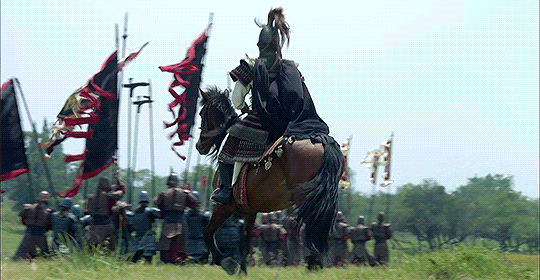
Most of all, NiF is kind to give him the ending he wants. There’s a great comment I read about how Xiao Xuan tacitly acknowledges Lin Shu’s identity when he lets him go to war as the army supervisor, because a commoner like Su Zhe wouldn’t even deserve to be in army leadership. To die on the battlefield has always been a glorious end in Lin Shu’s mind, but now it is doubly so, because he can finally die serving his country openly, and there is no better ending for Mei Changsu.
